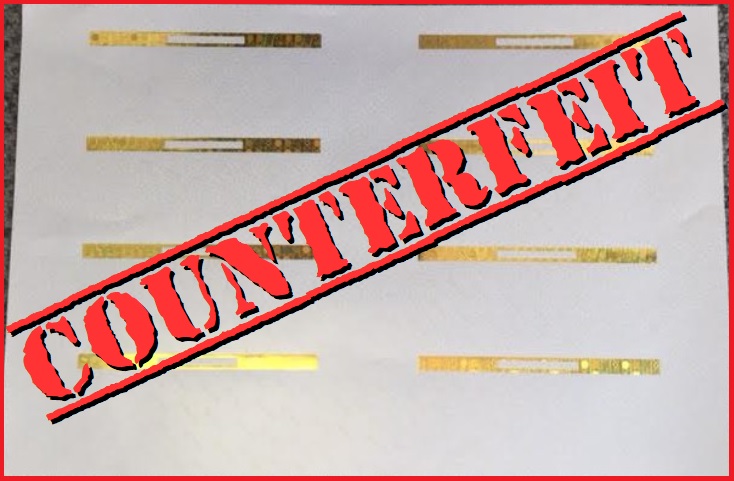
A Connecticut man who took advantage of a gaping security hole to create and sell thousands of counterfeit coupons has been sentenced to five years of probation, avoiding what could have been a lengthy prison sentence of up to 20 years. And, in a most unusual twist, he’s been ordered to pay an as-yet-to-be-determined amount of restitution – most likely to the couponers who bought and used his creations, while the manufacturers defrauded by his fake coupons will be forced to wait to see whether they get anything at all.
50-year-old Thomas Papcin of Naugatuck, Connecticut found out his fate this morning, more than two years after he pleaded guilty to mail fraud. For about three years, from 2013 to 2016, Papcin created high-value counterfeit coupons that looked very real – because they were printed on very real, heavy-duty, glossy, watermarked, hologram-imprinted coupon paper that’s described by its manufacturer as “the perfect product for printing high value and free product coupons.”
The catch is that it’s “the perfect product” for authorized coupon printers, not for anyone who asks for it. But Papcin asked for it – and got it.
In his plea agreement, Papcin admitted to getting in touch with the coupon paper manufacturer, taking advantage of what his attorney described as a “security gap” by posing as a representative of the “Foxon Park Soda Company” and “Garden Fresh Baby.” He provided fictitious contact information for both companies, and the paper manufacturer sold him reams of coupon paper on at least two separate occasions.
Papcin then used the coupon paper to print his very own – very unauthorized – coupons. His counterfeit creations offered free items from a number of different brands, and were eagerly snapped up by customers who purchased them from him online. It wasn’t until a tipster alerted authorities, that an investigation was launched and Papcin was nabbed on a charge of mail fraud for sending his counterfeits via the U.S. Postal Service.
Papcin’s attorney argued, and the prosecution appeared to agree, that the primary victims of Papcin’s crime were not the retailers or manufacturers who lost anywhere from hundreds of thousands to millions of dollars, as a result of the numerous counterfeit coupons that were accepted at checkouts across the country – but Papcin’s customers, who paid a few bucks apiece for his creations and used them to get free stuff.
The Coupon Information Corporation, which represents manufacturers in the fight against coupon fraud, addressed the court, though the defense seemed puzzled about why. “The organization is not a victim,” Papcin’s attorney claimed.
CIC Executive Director Bud Miller explained how “every time a counterfeit coupon is accepted, someone is going to have to pay the price,” whether it’s manufacturers, retailers or consumers who ultimately suffer the consequences. “The full economic impact goes beyond the manufacturer and the retailer,” he said.
“There are consequences for the industry,” the prosecution acknowledged – though prosecutors have not yet calculated the losses to manufacturers or retailers. Instead, astonishingly, they spent time going through Papcin’s business records and reached out to his customers to inform them they were eligible to be reimbursed.
Unsurprisingly, many who purchased counterfeit coupons online to illicitly obtain free products seemed to be somewhat spooked to be contacted by federal authorities. “Not every customer is interested in restitution,” prosecutors told the court, and “not every victim has responded to the government’s inquiries.” Perhaps, prosecutors acknowledged, it was because “some individuals were aware that they were purchasing fraudulent coupons.”
Perhaps!
Papcin’s attorney had asked the court for a more lenient sentence of probation without prison time, pointing out that he has worked to get his life back on track after battling addiction. “Papcin’s desperation to finance his addictions clouded his judgment and drove his criminal behavior,” his attorney stated. So he turned to coupon fraud, which his attorney says he didn’t know was a thing. “I really didn’t know what that meant,” Papcin’s attorney told the court. “I don’t know of any coupon fraud cases.”
And besides, “this case is not a fraud case where a defendant is driving a fancy car with ill-gotten gains, going on fantastic vacations, or living in a home that his legal income could not support,” the defense pointed out. “Although Mr. Papcin’s conduct was very serious, his conduct did not have the damage to the community seen in other areas of federal prosecution, such as drug trafficking, crimes of violence, or crimes involving children or corruption of American institutions.”
Prosecutors asked for a prison term of 41-51 months. Papcin’s crime “was not a one-time mistake or a simple bad decision,” they stated. “The defendant had to misrepresent himself to obtain holographic coupon paper from a holographic coupon manufacturer. He then had to print coupons on that paper. He had to list the coupons for sale on eBay and through other means. He had to keep track of to whom he sold coupons and then ship the bogus coupons to his customers. This is no small task.”
In addition, while “at first glance a ‘coupon fraud’ case may not seem that serious, that is not, in fact, the case,” prosecutors continued. “Counterfeit coupons cost manufacturers millions of dollars and have created numerous costs and challenges for retailers and other industry participants.”
That’s in addition to “the numerous customers who lost money buying coupons that did not work,” prosecutors claimed – though the fact that Papcin was able to keep his scheme going for three years and keep his customers coming back for more, suggests that the majority of his coupons did, in fact, “work”.
In imposing Papcin’s sentence, the judge expressed her belief that he would most likely have continued his crimes if he hadn’t gotten caught, and that news coverage of his case would likely serve as a deterrent for any other current or future coupon fraudsters.
That said, it’s debatable whether a sentence of no prison time, potentially no restitution to defrauded manufacturers, and refunds issued to those who bought Papcin’s counterfeit coupons online, is likely to be much of a deterrent.
The amount of restitution owed, and to whom, will be determined in the coming months. In the meantime, the Coupon Information Corporation says the “security gap” that Papcin took advantage of has been closed. And Papcin says he’s learned his lesson and is focused on getting back on the straight and narrow. But “fraud does have an impact,” the judge concluded. And Papcin will be paying the price – though to whom, and for how much, remains to be seen.
















The sentence of probation is a mere slap on the wrist and the lack of victim statements from those manufacturers who were defrauded is a disgrace and an embarrassment! Once again, the CIC has failed to effectively serve its CPG members! Another lost opportunity in a major coupon fraud case!